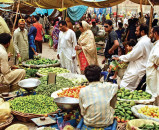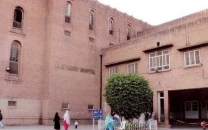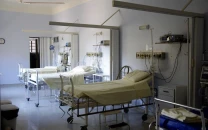City planning: Vision 2035 seeks coordination among city govt departments
Construction of multi-purpose high-rises proposed to solve housing shortage.

Construction of multi-purpose high-rises proposed to solve housing shortage.. DESIGN: JAMAL KHURSHID
The Lahore Vision 2035 proposes establishment of a coordination committee with representation from all city government departments to ensure that their plans and operations take into consideration one another’s priorities.
The vision covers governance, transport, water, sewerage and solid waste management, real estate markets and intra-city commerce. Six principles of the vision are local solutions for local problems; city planning in consultation with residents; low-cost and affordable solutions; consideration of concerns of women, children and the elderly; environment-friendly governance by ensuring low-carbon emissions and need to increase public spaces for promotion of cultural life.

The document has been developed jointly by the Centre of Public Policy and Governance, Forman Christian College, the Urban Unit and the United States Agency for International Development.
Lead researcher Imdad Hussain says repetition of work and wastage of resources is common in Lahore owing to lack of coordination among city government departments. “We often read in the newspapers that a road is constructed and later dug up to lay sewage pipes. Such a situation can easily be avoided with coordination among city government departments,” he says.
The vision document holds lack of adequate public transport infrastructure responsible for the increased number of privately-owned vehicles on roads. It proposes development of a public transport system and road infrastructure that encourages bicycling and walking.
Hussain says the Rapid Urban Transport Programme being implemented by the government is inadequate. He says the programme has not taken into consideration the findings of a 2011 study conducted by the Japanese International Cooperation Agency (JICA).
The vision proposes the use of multi-storey buildings for residential as well as commercial purposes. It says with residences, shopping centers and recreational facilities located in the same building people can avoid travel around the city for routine chores.
Hussain says the proposals on housing have been devised in view of the needs of low income households. He says Integrated Master Plan of Lahore 2021 had proposed development of private housing schemes that catered mostly to middle and upper income households. Alongside, he says the vision on housing was inspired from the development plan of the Walled City. “Spaces used for living, commerce and recreation in the Walled City are all very close to one another,” he adds.
The document also discusses tax collection issues. Hussain says people don’t pay their taxes because they don’t trust the government with their money. He says this trust deficit can be removed if decisions on spending are made in consultation with them.
Hussain says an important aspect of vision 2035 is empowerment of democratically elected local governments.
Speaking at the launch ceremony on Tuesday, Hussain Naqi of the Human Rights Commission of Pakistan expressed his reservations over the current provincial government’s desire to devolve power. He said the chief minister retained a lot of power over the provincial bureaucracy. “This may curtail autonomy of local governments,” he added.
Centre for Public Policy and Governance head Saeed Shafqat said the research team had been consulting parliamentarians about the Vision 2035 and hoped that it would be implemented by the government.
Published in The Express Tribune, June 17th, 2015.



















COMMENTS
Comments are moderated and generally will be posted if they are on-topic and not abusive.
For more information, please see our Comments FAQ